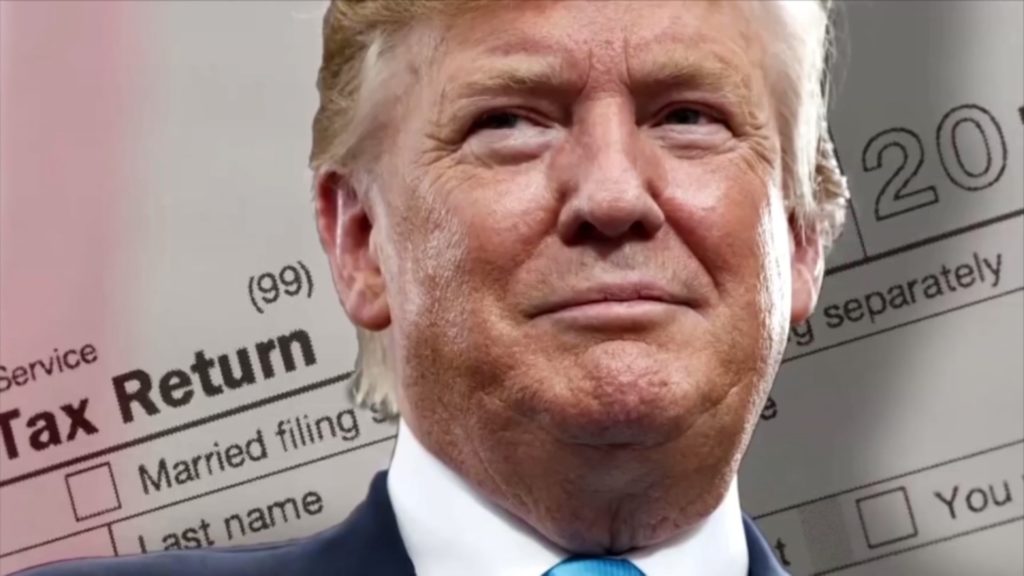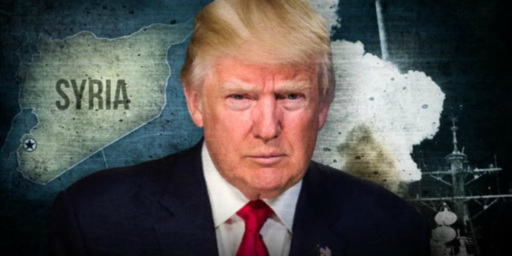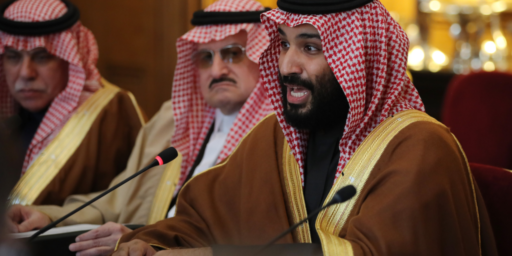Trump Taxes: Corruption and Foreign Influence
The Times investigation sheds more light on what most of us already knew.

I find the feature story rolling out the New York Times‘ investigation into Donald Trump’s tax returns, “LONG-CONCEALED RECORDS SHOW TRUMP’S CHRONIC LOSSES AND YEARS OF TAX AVOIDANCE,” frustrating. While I understand that destroying the image of Trump as a hugely successful businessman is likely to sell more papers, it buries the lede on the far more important story: the President of the United States is leveraged to the hilt and is profiting from his office.
Granted, this is a rollout—and a successful one from a marketing standpoint—of what promises to be a weeks-long series. Still, it seems more designed to goad Trump into reaction than focusing on the true news story. The write-offs and the like strike me as salacious gossip designed to influence an ongoing re-election bid more than truly newsworthy. The double-dealing and the fact that the sitting President owes a lot of people a lot of money is, by contrast, something that the American people legitimately ought to know.
Similarly, while the infographic “CHARTING AN EMPIRE: A TIMELINE OF TRUMP’S FINANCES” is beautiful and intricately crafted, it seems designed to be time-consuming rather than useful. I finally gave up scrolling down in hopes of finding evidence of corruption.
That said, I slogged through the former to buttress the information contained in David Leonhardt’s snapshot that I chronicled here about the public policy implications. They are not all that surprising, frankly, but damning nonetheless.
As the president wages a re-election campaign that polls say he is in danger of losing, his finances are under stress, beset by losses and hundreds of millions of dollars in debt coming due that he has personally guaranteed. Also hanging over him is a decade-long audit battle with the Internal Revenue Service over the legitimacy of a $72.9 million tax refund that he claimed, and received, after declaring huge losses. An adverse ruling could cost him more than $100 million.
The longstanding audit is the ostensible reason why Trump has not released his tax returns. Why it has taken this long to complete is a matter of conjecture.
Now, with his financial challenges mounting, the records show that he depends more and more on making money from businesses that put him in potential and often direct conflict of interest with his job as president.
[…]
And within the next four years, more than $300 million in loans — obligations for which he is personally responsible — will come due.
While the conflicts of interest have long been obvious to those paying even casual attention, the fact of massive loan obligations is, I believe, new news. Granting that he was at one point making some $400 million annually from The Apprentice and related marketing ventures, that seems to have largely dried up.
Against that backdrop, the records go much further toward revealing the actual and potential conflicts of interest created by Mr. Trump’s refusal to divest himself of his business interests while in the White House. His properties have become bazaars for collecting money directly from lobbyists, foreign officials and others seeking face time, access or favor; the records for the first time put precise dollar figures on those transactions.
Again, this has been obvious going back at least to his time as President-Elect. For reasons that escape me, these potential conflicts were hardly mentioned during the campaign and weren’t something I gave much thought to ahead of time. (Presumably, this was at least partly a function of outrage saturation of a like we’ve never seen before with so many seemingly game-over scandals bouncing off him.)
Still, the numbers are interesting:
At the Mar-a-Lago club in Palm Beach, Fla., a flood of new members starting in 2015 allowed him to pocket an additional $5 million a year from the business. In 2017, the Billy Graham Evangelistic Association paid at least $397,602 to the Washington hotel, where the group held at least one event during its four-day World Summit in Defense of Persecuted Christians.
That’s not illicit per se but certainly raises red flags. It’s why we made Jimmy Carter divest his peanut farm. Granting that Trump’s party controlled both the House and Senate the first two years of his presidency, it’s remarkable to me that Democrats haven’t banged the drum harder on this. It’s the sort of scandal that requires little sophistication to understand: it’s garden variety corruption on a large scale.
The Times was also able to take the fullest measure to date of the president’s income from overseas, where he holds ultimate sway over American diplomacy. When he took office, Mr. Trump said he would pursue no new foreign deals as president. Even so, in his first two years in the White House, his revenue from abroad totaled $73 million. And while much of that money was from his golf properties in Scotland and Ireland, some came from licensing deals in countries with authoritarian-leaning leaders or thorny geopolitics — for example, $3 million from the Philippines, $2.3 million from India and $1 million from Turkey.
Again, it’s impossible to know whether and how much these amounts differed from what they would have been had Trump not been elected. But they’re obvious conflicts of interest that simply shouldn’t exist.
No subject has provoked more intense speculation about Mr. Trump’s finances than his connection to Russia. While the tax records revealed no previously unknown financial connection — and, for the most part, lack the specificity required to do so — they did shed new light on the money behind the 2013 Miss Universe pageant in Moscow, a subject of enduring intrigue because of subsequent investigations into Russia’s interference in the 2016 election.
The records show that the pageant was the most profitable Miss Universe during Mr. Trump’s time as co-owner, and that it generated a personal payday of $2.3 million — made possible, at least in part, by the Agalarov family, who would later help set up the infamous 2016 meeting between Trump campaign officials seeking “dirt” on Mrs. Clinton and a Russian lawyer connected to the Kremlin.
In August, the Senate Intelligence Committee released a report that looked extensively into the circumstances of the Moscow pageant, and revealed that as recently as February, investigators subpoenaed the Russian singer Emin Agalarov, who was involved in planning it. Mr. Agalarov’s father, Aras, a billionaire who boasts of close ties to Mr. Putin, was Mr. Trump’s partner in the event.
Now, 2013 was before Trump’s candidacy, much less his presidency. I’m not sure this tells us anything new. But that’s only because the level of known corruption and foreign entanglement was already so high.
In May, the chairman of a trade group representing Turkish business interests wrote to Commerce Secretary Wilbur Ross urging support for increased trade between the United States and Turkey. The ultimate goal was nothing less than “reorienting the U.S. supply chain away from China.”
The letter was among three sent to cabinet secretaries by Mehmet Ali Yalcindag, chairman of the Turkey-U.S. Business Council, who noted that he had copied each one to Mr. Trump.
The president needed no introduction to Mr. Yalcindag: The Turkish businessman helped negotiate a licensing deal in 2008 for his family’s company to develop two Trump towers in Istanbul. The tax records show the deal has earned Mr. Trump at least $13 million — far more than previously known — including more than $1 million since he entered the White House, even as his onetime associate now lobbies on behalf of Turkish interests.
Mr. Yalcindag said he had “remained friendly” with Mr. Trump since their work together years ago, but that all communications between his trade group and the administration “go through formal channels and are properly disclosed.”
The ethical quandaries created by Mr. Trump’s decision to keep his business while in the White House have been documented. But the full financial measure of his extraordinary confluence of interests — a president with a wealth of business entanglements at home and in myriad geopolitical hot spots — has remained elusive.
Again, that he’s made $13 million since 2008, only $1 million of which has been since 2017, tells us very little. Hell, he might have lost money on the deal as a result of taking office. But, again, the fact that there’s an ongoing business relationship in a country with an increasingly autocratic country with which the US has major foreign relations issues raises ethical questions that simply shouldn’t exist.
Based on the financial disclosures, which report much of his income in broad ranges, Mr. Trump’s earnings from the Istanbul towers could have been as low as $3.2 million. In the Philippines, where he licensed his name to a Manila tower nearly a decade ago, the low end of the range was $4.1 million — less than half of the $9.3 million he actually made. In Azerbaijan, he collected more than $5 million for the failed hotel project, about twice what appeared on his public filings.
It did not take long for conflicts to emerge when Mr. Trump ran for president and won. The Philippines’ strongman leader, Rodrigo Duterte, chose as a special trade envoy to Washington the businessman behind the Trump tower in Manila. In Argentina, a key person who had been involved in a Uruguayan licensing deal that earned Mr. Trump $2.3 million was appointed to a cabinet post.
The president’s conflicts have been most evident with Turkey, where the business community and the authoritarian government of President Recep Tayyip Erdogan have not hesitated to leverage various Trump enterprises to their advantage. When Turkish-American relations were at a low point, a Turkish business group canceled a conference at Mr. Trump’s Washington hotel; six months later, when the two countries were on better terms, the rescheduled event was attended by Turkish government officials. Turkish Airlines also chose the Trump National Golf Club in suburban Virginia to host an event.
These sort of conflicts appeared as soon as Trump was elected. Even as President-Elect, foreign leaders, businesses, and various lobbying interests started staying in Trump properties and otherwise courting favor through this venue. It’s exceedingly problematic.
This, too, is simply more data for an old story:
More broadly, the tax records suggest other ways in which Mr. Trump’s presidency has propped up his sagging bottom line. Monthly credit card receipts, reported to the I.R.S. by third-party card processing firms, reflect the way certain of his resorts, golf courses and hotels became favored stomping grounds, if not venues for influence-trading, beginning in 2015 and continuing into his time in the White House.
The credit card data does not reflect total revenue, and is useful mainly for showing short-term ups and downs of consumer interest in a business. While two of Mr. Trump’s marquee draws — the Washington hotel in the Old Post Office and the Doral golf resort — are loaded with debt and continue to lose money, both have seen credit card transactions rise markedly with his political ascent.
At the hotel, the monthly receipts grew from $3.7 million in December 2016 shortly after it opened, to $5.4 million in January 2017 and $6 million by May 2018. At Doral, after Mr. Trump declared his candidacy in June 2015, credit card revenue more than doubled, to $13 million, for the three months through August, compared with the same period the year before.
One Trump enterprise that has been regularly profitable, and is a persistent source of concern about ethical conflicts and national security lapses, is the Mar-a-Lago club. Profits there rose sharply after Mr. Trump declared his candidacy, as courtiers eagerly joining up brought a tenfold rise in cash from initiation fees — from $664,000 in 2014 to just under $6 million in 2016, even before Mr. Trump doubled the cost of initiation in January 2017. The membership rush allowed the president to take $26 million out of the business from 2015 through 2018, nearly triple the rate at which he had paid himself in the prior two years.
Some of the largest payments from business groups for events or conferences at Mar-a-Lago and other Trump properties have come since Mr. Trump became president, the tax records show.
At Doral, Mr. Trump collected a total of at least $7 million in 2015 and 2016 from Bank of America, and at least $1.2 million in 2017 and 2018 from a trade association representing food retailers and wholesalers. The U.S. Chamber of Commerce paid Doral at least $406,599 in 2018.
The Times fully admits that tax records tell an incomplete story. But, while Trump and company contend that the financial disclosure records he files every year paint the true picture, the Times is right that they don’t. The tax returns show details that can be hidden in the disclosure forms.
With the exception of the fact that Trump owes a lot of money that’s coming due soon—and the extent of what’s at stake in the IRS audit—all of this is merely detail for what we already knew. But putting numbers to the story is nonetheless illuminating. And, of course, the average voter is almost certainly paying less attention on a day in, day out basis than OTB readers and me.






Loomong large in all of this is that the IRS is currently run by someone with a vested interest in the Trump brand;
https://www.forbes.com/sites/alisondurkee/2020/09/01/irs-chief-makes-more-than-100000-per-year-off-trump-property-documents-show/#3dfa60007488
@Daryl and his brother Darryl: Yes, good point. It’s almost certainly unprecedented for someone to be elected President while the IRS he is about to take over is deciding whether he stole $80 million from the Treasury. Normally, we would have had some sort of independent commission in charge of the matter. Alas, these are not normal times.
The legalities will be sorted out by Cy Vance and whoever Biden appoints as AG. This story is simple: Trump is a shitty businessman and a fraud, a con-man skating along on loans he cannot repay. The source of those loans? We don’t know yet, but I suspect we will. Vance has had all this for a while. Federal grand juries will dig further once the odious Barr slithers out of view.
Trump got elected as a businessman. Well, he’s not a businessman, he’s a pampered rich snot who burned through all of Daddy’s money like the wastrel third son of a fading aristo. Now he needs more money. Where’s it going to come from? How do you borrow 300 million to cover 300 million in unsourced loans? I guess if you’re a catastrophically bad money manager up to his eyeballs in debt while his assets evaporate, you’d need a really good friend. Even better than dirty Deutschebank.
“Hello? Hello? Wells Fargo? I owe 300 million, my income is down to pocket change, probably gonna be indicted as a tax cheat and all of my assets are losing value, so can I…?”
No, he won’t get that from a legit bank. Will one of the real billionaires bail him out? Nah, not 300 million, not for this assclown who’s about to go down.
Which leaves. . .who? Can we think of anyone with a lot of untraceable cash on hand? Hmmm? Any names come to mind? I know, let’s follow the forensic evidence. Let’s check and see whether Trump’s lip prints are still visible on MBS’s ass. Wait, is that Trump’s DNA all over Putin’s prick?
Do we really have to go through round 500 of, ‘Well, I don’t know, I’m troubled by the timing, I’m not sure this adds up to a crime, hem and haw and harrumph?’ How close do the dots have to be for people to connect them? Sometimes 1 + 1 just equals 2.
He’s owned. Has been from Day One. Just like any poor slob whose horse faded in the stretch and now owes Ralphie Cifaretto the vig. Owned.
Oh, wait, did we see 300 million? Turns out it may be 1.1 billion. With a ‘b.’
@Michael Reynolds:
NPR reporter Adam Davidson:
Some clear implications from the Trump Tax story:
– He blew through other people’s money. His dad’s. Then Mark Burnett’s. Plus loans.
– he starts blowing through the most money in 2011, when the known sources disappear.
– He had a new source of funds.
1/
— Adam Davidson (@adamdavidson) September 28, 2020
– This new source had more money and seems to have put fewer restrictions on his spending.
– Only question for us as a nation: what is that new source of money?
– As I’ve written obsessively, 2011 is when he gets into business with the Mammadovs.
2/
— Adam Davidson (@adamdavidson) September 28, 2020
– Soon after, he’s in business with the Agalarovs, flirting with Georgians and Kazakhs with ties to Putin.
– All of these groups are—between 2011 and 2016—known to be laundering money through golf courses.
3/
— Adam Davidson (@adamdavidson) September 28, 2020
– Golf courses are one of the best ways to launder large amounts of money.
So, next step: look to Scotland. That is where he spent this money, where the businesses make the least sense.
The math seems clear: *somebody* was giving him 100s of millions to spend.
4/
— Adam Davidson (@adamdavidson) September 28, 2020
Until we know who, we don’t know who this man owes and what they know about him.
5/end
— Adam Davidson (@adamdavidson) September 28, 2020
Presidential debate Oct. 15 is town hall format, might be a chance to see whether the public has much interest in Trump’s taxes.
@Michael Reynolds:
Indeed.
To state the obvious: this is a gigantic problem even if his creditors are red-blooded, apple pie-loving Americans.
The fact that it’s probably Russian oligarchs makes an already very bad situation even worse.
@Michael Reynolds:
Cy Vance has allowed the Trumps to get away with shenanigans before…I’m not holding my breath, now.
https://www.propublica.org/article/ivanka-donald-trump-jr-close-to-being-charged-felony-fraud
I still think the best part of this is the $70K deduction for hair styling.
I would pay $750 for Biden to start laughing on the debate stage and say; “Dude, you paid $70,000 for THAT?”
@Daryl and his brother Darryl:
Doesn’t seem like much of an ROI, does it? I’d love to see the receipts.
The point has been made by someone (I forget who) that someone with this level of debt would never be granted a security clearance. Of course, being elected president bypasses that but there’s a reason for that rule.
James, after the first paragraph of this post plus the last few posts, it’s clear that In the end, you really can’t accept reality. You have got to find or manufacture and out.
@charon:
Sorry Charon my fat fingers hit the wrong key. But, last week I asked if there would be more than one debate and some responded there would not be. There definitely won’t be a town hall style debate, I’m confident of that.
While corruption and foreign influence is very important, the line of political attack will be directed at the massive losses and monetary mismanagement Trump has incurred and engaged in.
There’s no way he’ll continue to poll well in economic matters.
Also, and perhaps most important, he can be branded a loser and a fraud. One-term loser Trump. He holds on to money like a drunk sailor on leave.
@Barry:
You’re going to have to be more specific.
@Kathy:
I can’t fathom the individual who thinks Trump is doing a bang-up job on the economy, notwithstanding the massive collapse since March, and yet is going to change his mind based on Trump’s personal finances.
@Barry: james, I apologize for my bad comment. When I read more posts, I realize that I was being unfair.
@James Joyner:
Well, the collapse since March wasn’t his fault when it happened. He’s making it worse by refusing to adopt the measures that will end the epidemic in America sooner, though, and by failing to pass another round of increased aid to those most affected.
But part of the approval he enjoyed on the economy had a lot to do with his image as a tycoon (as well as motivated reasoning and narratives by him and the GOP). A Potemkin tycoon is far less impressive.
He may lose no ground with his base, but he probably will lose with saner Republicans and Independents.
If the Democrats have any brains, they should make ads that showed Trump squandered the good economy he inherited from Obama by slowing it down with tariffs and letting it languish in COVID Hell, just as he squandered the money he inherited from his father. Paint him as a magnet for monetary losses.
@James Joyner:
If you’re retired and living off your investments, the fact the market if frothy might have you believing that Trump is doing a good job. I have a couple of friends who take that position, though due to Covid and how reprehensible he is, the won’t vote for him.
@Kathy:
My sense is that this will hurt trump on the margins. If his support dropped even 1 or 2% it would be devastating for him, even if they just stayed home.
@Kathy: They could also run some ads showing the lifestyles of middle-class Americans and the taxes they pay, followed by images of Trump’s private jet and golden toilet with the voiceover saying “and he paid $750 a year…if he paid at all.”
@Daryl and his brother Darryl:
This is actually interesting. I don’t know whether Trump claims that he actually owns the Hawaii property but if so it is part of a pattern. Trump claims to own something and list it as an income generating asset when seeking investors or looking for a loan. But in reality it was all sold off piecemeal to small investors who probably paid too much because of the thrill of being part of the Trump empire.
There was a really intriguing comment from one of the pre-covid articles about Trump’s trouble in NYC. It mentioned that the individual owners of the Trump Hotel were unhappy because they were getting very little business due to the Trump name. The implication was that some number of rooms, maybe all of them, were owned by individuals on a one by one basis, with The Trump Organization managing the hotel as a whole (for hefty fees no doubt).
This little detail has fascinated me because I remember it being reported way back when Trump was going spectacularly bankrupt that the banks were letting him stay personally solvent because “he was worth more if people saw him as a successful businessman”. I always wondered what that could actually mean. Just in what way was Trump worth more to them if people thought he was wealthy? I also wondered how he ended up with Trump Tower. But that article snapped a light bulb in my head. What if the deal with Trump was that his organization could manage the properties (banks don’t want to be property managers) and he would schmooze and wheedle and play the big man and get suckers lined up to pay 2-3 times the going rate as the bank sold the buildings off room by room, office by office? I have no proof of this, of course, but I would be willing to bet a fair amount that’s what happened.
@MarkedMan:
Commercial real estate development is a confidence game. Everybody is scared they will get fleeced. The image of a massively successful person helps ease those fears. No con man tries to get rich people to loan them money by pretending to be poor. Rich people only trust other rich people, generally speaking.
On the issue, I can’t see enough to tell if he’s in trouble or not. He may have shares of ownership in a great many holdings but didn’t report them to the bank. Need a tax return to get the whole story. Moreover, it says he was getting $400 mil a year as a game-show host. Imagine he could go for Rush Limbaugh money now, should he suddenly have a bunch of free time on his hands. Article says he’s on the hook for only $300 mil. I have no idea what they are thinking.
Making Rush money he could get that much in a couple months. I don’t see anything here that compels another bankruptcy, not for this guy. Also, if he owes the money to shady Russian investors bankruptcy won’t help. “In US you declare bankruptcy, in Russia bank rupture you.”
@dazedandconfused:
you might want to reread.
@Mikey:
Turnberry eh?
It would be very interesting to to look very closely at the sources of the investment money, what exactly the expenditures at Turnberry are, and exactly what the financial transactions (nominal price vs actual monies received) are on the Turnberry estate properties sold.
Often to persons from Russia or other “former Soviet states”.
And especially given the frequent use of UK property for “tax efficient” investment purchases.
And also to unravel the whole rats nest of interlocking companies, investment holdings and tiered share-ownership involved.
Its disappointing to see so much pure conjecture from you, James. Its what I would expect from your usual commentariat here.
The law on tax loss carry forwards changed under the Obama Administration. Trump applied them. Talk to Obama. It appears to be legitimate, but disputes with the IRS are typical. They are a feature of the code.
As for all the speculation about conflicts, that’s mostly quite the imagination, and short on facts and evidence.
I do note, the obvious conflicts with Biden and his son – payments, no show jobs, cushy deals, ridiculous China and Ukrainian subsidies have received scant attention at OTB. I guess morality is situational.
@keef: Never mind that big, fat elephant ass of the Trump kids and their no show jobs, cushy deals, and Chinese and Saudi Arabian subsidies hanging out the window, look at that mouse over there getting a piece of cheese!
Pitiful.
@keef:
Interesting indeed. And news.
Could you give me some details of Joe Biden’s Ukrainian subsidies? (you know, Joe Biden, the Biden who is the candidate.) His no-show jobs? His payments? His cushy deals?
Or are you just flinging mud at Hunter Biden again and hoping some sticks?
Which might be relevant if he was, let’s say, running for President.
Compare with Donald Trump, the actual President and an actual Presidential candidate.
Who has, quite legally let us assume, arranged his taxes to pay the absolute minimum; legal maybe, but politically relevant also.
He would have been wise to be open about that from the start.
And such arrangements are politically interesting, given the level of debate around tax levels and allowances, and the argued failure of wealthy individuals, families and corporations to pay an equitable contribution.
And such a pattern of loss making enterprises; what a sadly unfortunate business entrepreneur he is, to be sure.
But are you really maintaining that hundreds of millions of dollars in opaquely sourced loans are nothing to be concerned about?
Especially as you can hardly throw a rock at the crowd around Trump without hitting someone with connections to deeply worrying people.
Even among property developers, you might not expect connections to such as Felix Sater, David Bogatin, Tevfik Arif, Oleg Deripaska, etc. to crop up quite so regularly.
While taxes and tax reporting are difficult concepts, they are not impossible to understand. And this article from Forbes provides a lot of good context for those who are interested in learning a bit m0re:
https://www.forbes.com/sites/kellyphillipserb/2020/09/28/the-ordinary-taxpayers-guide-to-the-extraordinary-story-of-trumps-tax-returns/#4dc5d7bf5ba9
@keef:
I’m always curious with people like you? Do you know you’re lying to cover up for being lied to by the world’s most transparent con man? Or are you just as stupid as you seem?